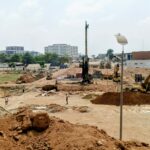By Lucy Ogalue
Dr Akinwumi Adesina, the African Development Bank’s President, says implementation of the Special Agro-Industrial Processing Zones (SAPZs) in Nigeria will reduce food imports, strengthen the Naira, and generate millions of jobs.
Adesina stated this on Thursday in Calabar, Cross River, at the groundbreaking of the SAPZ project on Thursday in Calabar.
He described it as a transformative initiative that would unlock the economic potential of Nigeria’s agricultural sector.
The AfDB president said for Nigeria to thrive, its rural areas must be awakened.
He said the country should not be importing food with its abundant arable land, cheap labour, and vast agro-ecological zones.
Nigeria should be completely self-sufficient in food and a significant exporter of food and agricultural commodities.
“By taking advantage of the special agro-industrial processing zones, Nigeria will now have the infrastructure and industrial platform to transform all its food and agricultural commodities.
“What a day we are celebrating today. The special agro-industrial processing zones will reduce food imports, conserve foreign exchange, expand production and processing of food and agricultural commodities.
“It will strengthen the Naira and attract significant private investment in agricultural value chains.
“The SAPCs will also revive and transform rural economies and create millions of jobs,” he said
Adesina commended the Federal Government for its commitment and strong political will under President Bola Tinubu, which he said had been pivotal to the rollout of the zones across multiple states.
He also lauded Vice President Kashim Shettima, for his consistent presence and unwavering support of the project.
“You have been the promoter, the facilitator, and the enabler of this vision. Your commitment speaks volumes,” he said.
The AfDB president reiterated that a financing package of $510 million had been secured for the first phase of the SAPZ programme in eight states and the Federal Capital Territory.
He said plans were underway to expand to 28 states in the second phase, backed by $2.2 billion from development partners.
Cross River State Governor, Sen. Bassey Otu, reaffirmed his administration’s commitment to harnessing the state’s vast agricultural potential to drive economic diversification and job creation.
“Our plan is to move from a non-renewable resource base to a sustainable agricultural economy that brings prosperity to every part of Cross River State,” Otu said.
He said the state would leverage its comparative advantage in the production of cocoa, palm oil, rice, and banana.
He said the state would also take advantage of its infrastructure, including the proposed Bakassi Deep Sea Port, Obudu Cargo Airport, and Calabar-Budu rail line, to support agro-industrialisation.
Vice President Shettima, in his remarks, reaffirmed the administration’s resolve to implement policies that would ensure food security, economic growth, and inclusive development.
Other dignitaries at the event included the Minister of Agriculture and Food Security, Sen. Abubakar Kyari, other government officials, senior officials from the AfDB and development partners and stakeholders.
The SAPZ programme is spearheaded by the AfDB in partnership with the Islamic Development Bank and the International Fund for Agricultural Development, and the government. (NAN)
Edited by Chinyere Joel-Nwokeoma











